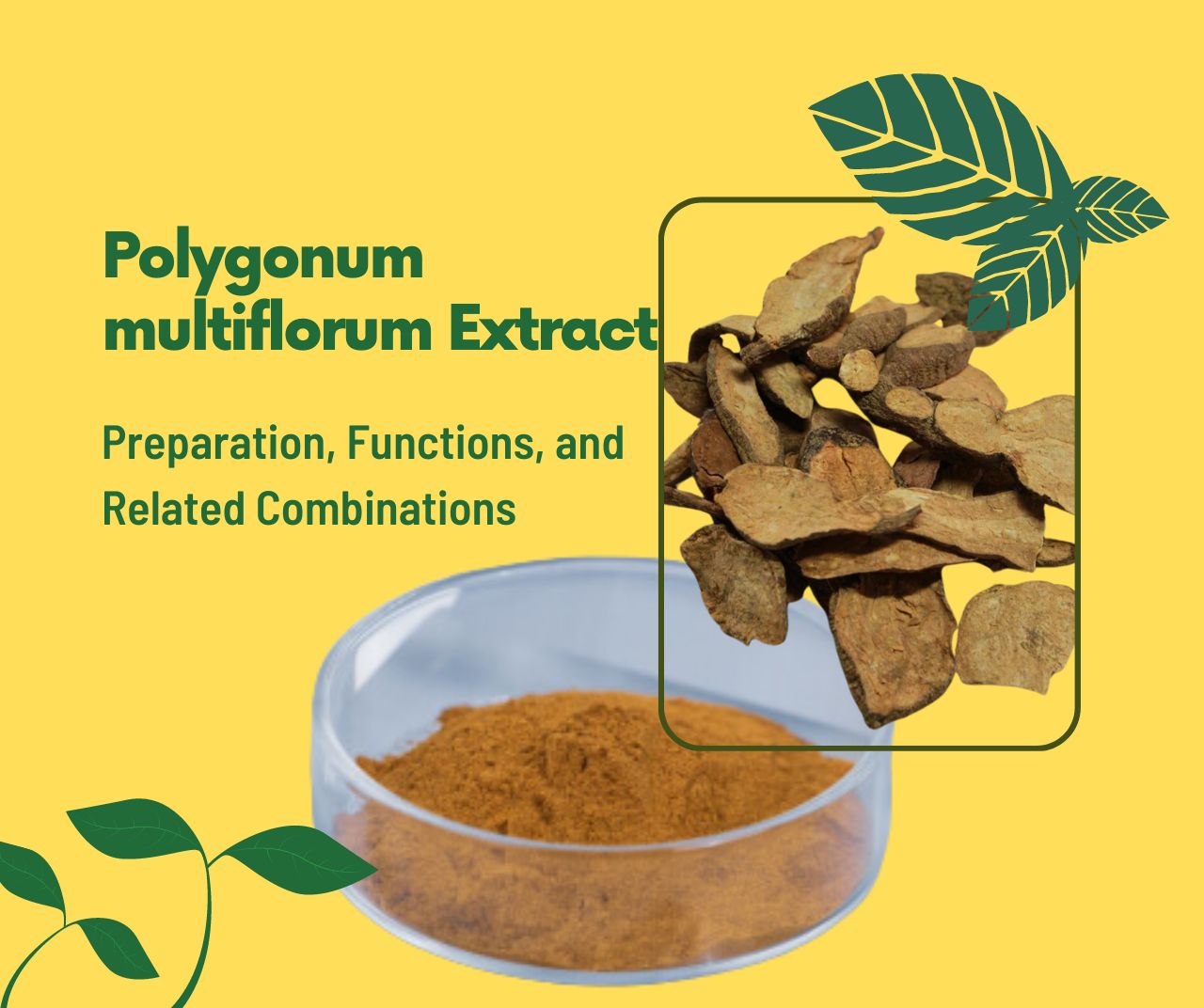Polygonum multiflorum extract is prepared using the dried rhizome of the Polygonum multiflorum plant, a member of the Polygonaceae family. The rhizomes are cleaned, dried, canned, and extracted three times using 70% ethanol-water solvent, with each extraction lasting 2 hours. The combined extract is then evaporated to remove ethanol, followed by further concentration to a specific gravity of 1.10 to obtain a concentrated paste. This paste is spray-dried to obtain Polygonum multiflorum extract powder, which is then crushed, sieved through a 100-mesh screen, mixed, and packaged.
English Name: Radix polygoni multiflori P.E.
Other name: Tuber fleeceflower extract, fo-ti Extract, Ho Shou Wu
Latin Name: Polygonum multiflorum Thunb
Main Functional Components:
The rhizomes contain anthraquinone compounds, primarily stilbene glucosides, emodin, chrysophanol, physcion, rhein, and chrysophanol anthrone.
Main Functions:
Polygonum multiflorum extract exhibits anti-aging effects, influences the immune system, lowers blood lipids, prevents atherosclerosis, protects the heart muscle, supports liver health, provides neuroprotection, and possesses antimicrobial properties. It is not recommended for patients with diarrhea or pregnant women.
Usage:
In traditional Chinese medicine, Fo-ti has a long history of use in treating liver and kidney ailments due to its believed ability to nourish Yin energy and maintain bodily balance. It is also used in cosmetics for its ability to darken hair. The recommended dosage of a 4:1 extract is 500-800mg, taken in two divided doses on an empty stomach.
Related Combinations:
- For treating blood deficiency and insomnia, Fo-ti is often combined with Rehmannia, Angelica sinensis, and Sour Jujube Seed.
- For treating a deficiency of essence and blood, along with symptoms like sore lower back, dizziness, and premature graying, it is combined with Angelica Sinensis, Lycium barbarum, and Dodder Seed.
- For treating liver and kidney deficiency with symptoms like sore lower back and dizziness, it is combined with mulberry fruit, black sesame, and Eucommia bark.
- For long-term malaria and weakness due to Qi and blood deficiency, it is used with Ginseng, Angelica sinensis, tangerine peel, and ginger.
- For treating ulcers, boils, and itchy skin, it is combined with Prunella vulgaris, Oyster Shell, and Angelica sinensis.
- For treating various skin conditions, it is used with Saposhnikovia divaricata, Sophora flavescens, and Mentha haplocalyx in a decoction for washing.
- For elderly individuals with blood deficiency, intestinal dryness, and constipation, it is combined with Cistanche, Angelica sinensis, and Hemp Seed to moisturize the intestines and promote bowel movements.
Toxicity: Polygonum multiflorum contains anthraquinone derivatives with laxative effects, so it should not be used by individuals with loose stools. Raw Fo-ti is more toxic than processed Fo-ti. The LD50 of raw Polygonum multiflorum alcohol extract administered orally to mice is 50g/kg, while the LD50 via intraperitoneal injection is 2.7g/kg. The toxicity of processed Fo-ti alcohol extract via intraperitoneal injection is more than 54.5 times lower than that of raw Polygonum multiflorum alcohol extract, and the toxicity via oral administration is more than 20 times lower. Therefore, the clinical use of processed Polygonum multiflorum is justified.








